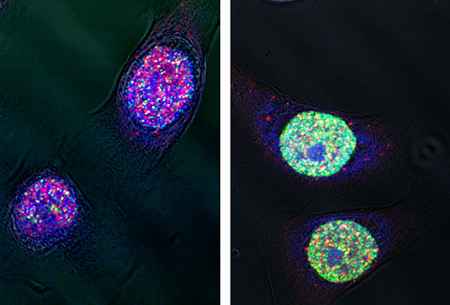 |
|||
Research SummaryCarcinogenesis is a complex process. In any individual, the interplay between genetics, environmental exposure and age combine to create conditions more or less favorable for the development and dissemination of cancer. For cancer cells to develop and thrive, they must acquire a variety of specific capabilities: growing inappropriately, avoiding elimination by defense mechanisms, stimulating their microenvironment, providing needed support and spreading to new locations within the body. The processes that regulate these acquired abilities include gene expression as controlled by chromatin structure, signal transduction events in response to cell-cell interactions, hormone exposure and fatty acid metabolism and DNA damage and repair responses. The Laboratory of Molecular Carcinogenesis (LMC) — headed by Laboratory Chief Trevor K. Archer, Ph.D. (http://www.niehs.nih.gov/research/atniehs/labs/lmc/resources.cfm#message) — is dedicated to elucidating the molecular mechanisms that facilitate these processes in the hope that understanding will lead to improved cancer prevention and therapy. The goal of the LMC is to define the fundamental molecular mechanisms by which environmental exposures lead to cancer. The pursuit of molecular and environmental causes of cancer represents a synergistic approach to cancer prevention and treatment. Knowing the target genes for environmental agents will permit the development of improved methods for the identification of environmental carcinogens in both laboratory and epidemiological studies. 
Cells treated with ultraviolet radiation show an increase in CPD adducts
(green). The core NuRD complex member Mi-2 (red) has been shown to be
upregulated by treatment, but does not co-localize to sites of damage. (C.
Burd & TK Archer)
The LMC is comprised of eight independent research groups forming a multidisciplinary team of cancer researchers with expertise in biochemistry, cell biology, epidemiology, molecular biology and oncology. LMC scientists bring diverse perspectives to their work, which provides an ideal opportunity for the study of cancer from the molecular level to the clinical. The LMC is actively involved in the following basic research:
Environmental agents influence cancer development by causing mutation in critical target genes, epigenetic modifications and by altering signal transduction pathways in and between cells, all active areas of research in LMC. Strong ties with the Environmental Toxicological Program (ETP) and the Epidemiology Branch of the NIEHS allows LMC to be very active in the understanding of the etiology of cancer. The LMC is dedicated to elucidating the molecular mechanisms that facilitate these processes in the hope that understanding will lead to improved cancer prevention and therapy. Scientific Support Staff
|
|||

